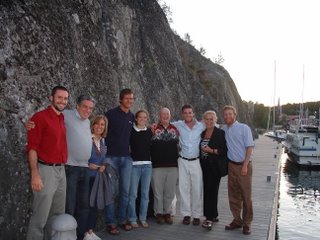May 12th
Providence, RI, USA
Greetings Readers,
I came across another point of Interest in Vinci's book today regarding his proposed location of Hades (the land of the dead), and the reasons that it may have been described as lying so far north by Homer and the bards that came before him.
Vinci's theory of Baltic origins is rooted on the belief that Homer's stories contain a multitude of factual references. From this perspective Homer's works are not seen as being primarily (or even partially) fictional, but are viewed as a compilation of geographic and cultural allegories that are based on the events of the people who lived during this time period.
It is from this historical perspective that Vinci draws out his theories regarding Hades origin.
Since Vinci proposes that Hades can be located on a map using climatological and geographical descriptions from Homers narratives, then the question becomes not whether it exists, but rather why the poets of that time period placed it in, what is today, northern Russia.
Vinci's answer to this is that the migration southward necessitated leaving behind not only basic physical infrastructure, but also the burial grounds and temples that were part of these communities history. To account for the loss of these loss of these important cultural artifacts, Vinci proposes that the bards who passed down the Odyssey modified it to create a literary world in which Hades was representative of the land that their cultural forefathers had been buried in.
If this is the case, than it is a fascinating example of the way in which people can adapt their historical narratives to reflect a changing environment.
A modern day example of this adaptation can be found in the Finnish town of Toija (which we will be visiting in our travels). Vinci has proposed this town, and the surrounding area, as being the former location of the city of Troy.
To say that the locals embraced the idea would be an understatement.
Almost immediately the community of Kisko (the area where Toija is located) began to integrate the possibility of this new found heritage into their lives. There was a wave of news coverage when the theory was initially put forward, followed by a variety of local initiatives that were intended to recognize and celebrate the meaning of Vinci's theory in the lives of the local community.
This so called "renaissance of Kisko-Seura" (the society that organizes community events in Kisko) is described here in a passage from the community website:
"In the summer of 1994, only a couple of months after the first article on the theory appeared in the Finnish media, Kisko-Seura organized the coronation of the first Helen of Toija, opened an art exhibition called Ulysses in the North, and had a play performed by
amateur actors."
However the greatest feat for this small community was the renovation of an old storage barn that had previously been used to store farm equipment. In order to prepare the building for the coming celebrations the locals farmers worked together for months, finishing it just in time for the beginning of the celebrations in June.
Since then the community has continued to celebrate their place as the northern Troy. Every year they coronate a new "Helen of Troija", and continue to sponsor a range of cultural events in the renovated storage barn.
What I find noteworthy about this transformation is that in many ways it represents the cyclical nature of historical adaptation. Vinci theory suggests that Homer altered his stories to compensate for the missing pieces of his communal heritage. Toija, on the other hand, was vaulted into a cultural "renaissance" when they learned about a part of their heritage that they may have been missing for thousands of years.
Just as each individual is prone to alter their memories of the past to adapt to changing situations in the present, so too communities are able to use common stories to adjust to rapidly changing environmental and cultural realities.
It is these realizations that help me to see why I, as a psychology major, may indeed find my place on this historical voyage.
That and the fact that after spending three weeks on a cramped boat my traveling companions may all be in need of a little informal counseling. The question then will be whether I have retained enough sanity to offer it.
-Caleb


0 Comments:
Post a Comment
<< Home